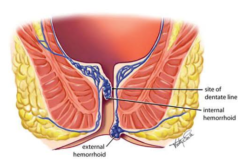
Hemorrhoids, What Should I Tell My Doctor About Them?
Hemorrhoids are swollen veins in the rectum or anus, which can be pretty painful. In most cases, hemorrhoids can be treated with over-the-counter medications or home remedies. However, hemorrhoids may also be a sign of another health problem. If you experience symptoms such as pain, bleeding, itching, and lumpy stool for more than ten days, then consult your doctor about treatment options (typically including surgery).
It's essential to get hemorrhoids checked out by a professional because hemorrhoid symptoms could also indicate other serious problems like colorectal cancer, which is usually fatal if not caught early on. Moreover, there are some home remedies that may relieve hemorrhoidal symptoms without having to see a doctor. If you're looking for treatments without a doctor visit, then these tips may be helpful to you:
-Apply an ice pack or cold compress to the area for 10 minutes, three times a day.
-Take over-the-counter hemorrhoid medications like Tylenol, ibuprofen, or naproxen sodium.
-Soak in a warm bath for about 15 minutes, two times per day. Add baking soda, Epsom salts, or witch hazel to the water for extra relief.
-Use a hemorrhoid cream or ointment.
-Drink plenty of fluids and eat high-fiber foods to soften stool and reduce constipation.
What are hemorrhoids, and what causes them?
Hemorrhoids are swollen veins in the rectum or anus, which can be quite painful. Hemorrhoids can often be a sign of another health problem, and it's important to get them checked out by a professional. There are a few different things that can cause them, including straining during bowel movements, pregnancy, and chronic constipation or diarrhea.
What are the symptoms of hemorrhoids?
The most common symptom of hemorrhoids is pain and bleeding during a bowel movement. Other symptoms can include itching, swelling, and discomfort around the anus. You may also see blood on your toilet paper or in the toilet bowl after you've gone to the bathroom.
How are hemorrhoids treated?
There are a few different ways that hemorrhoids can be treated. In most cases, they can be treated with over-the-counter medications or home remedies, but in some cases, you may need to see a doctor. Some treatments that a doctor may recommend include prescription medications, surgery, or minimally invasive procedures such as laser treatment or radiofrequency ablation
The different types of hemorrhoids
There are three different types of hemorrhoids: external hemorrhoids, internal hemorrhoids, and prolapsed hemorrhoids.
External hemorrhoids are the most common type. They occur when the veins around the anus become swollen and irritated. Internal hemorrhoids are a bit less common, and they occur when the veins inside the rectum become swollen. Prolapsed hemorrhoids are the most serious type of hemorrhoid, and they occur when one or more of the internal hemorrhoids prolapse (or protrude) from the anus.
Symptoms of hemorrhoids can vary depending on their size and location. They may be itchy, painful, or just a general nuisance. Some common hemorrhoid symptoms include:
- Bleeding during bowel movements
- Itching or irritation in the anal area
- Pain, tenderness, or swelling around the anus
- A lump near the anus
- A feeling of fullness after bowel movements
Hemorrhoids can be a sign of another health problem, and it's important to get them checked out by a professional. Hemorrhoids are caused by many different things, such as straining during bowel movements, pregnancy, or chronic constipation or diarrhea. The most common symptom is pain and/or bleeding during a bowel movement, with other symptoms including itching, swelling, and discomfort around the anus.
There are three different types of hemorrhoids: external hemorrhoid, which occurs when veins around the anus become swollen; internal hemorrhoid, where vein inside the rectum becomes swollen; prolapsed hemorrhoid occurs when one or more internal haemorrhoidal protrude from the anal opening. There are various treatments available to treat them, such as medications (prescription), surgery, or minimally invasive procedures. If you are experiencing any symptoms, it is important to see your doctor right away.
